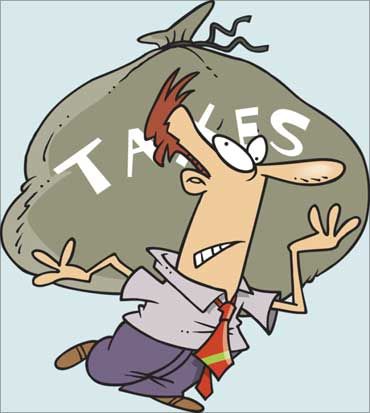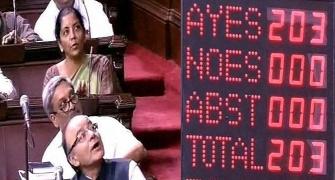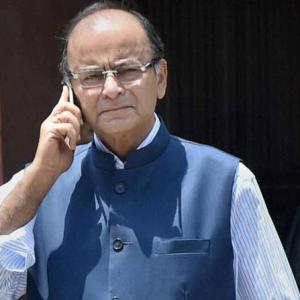 While the Indian industry pitched for a gradual reduction in number of goods and services tax slabs from four to ‘one or two’, tax consultants argued that imposition of a cess will complicate the proposed uniform indirect tax structure.
While the Indian industry pitched for a gradual reduction in number of goods and services tax slabs from four to ‘one or two’, tax consultants argued that imposition of a cess will complicate the proposed uniform indirect tax structure.
The GST Council arrived at a consensus on a four-tiered rate structure -- 5 per cent, 12 per cent, 18 per cent and 28 per cent -- and a cess on demerit items, including tobacco, pan masala, luxury cars and aerated drinks to compensate states for a possible revenue loss.
“GST rate structure can be an absolute limit of four rates as suggested by the government, and over time, the government should commit to converge to one or two rates,” the Confederation of Indian Industry stated.
It is also important that the bulk of goods and services should fall within the standard rate of 18 per cent and only exceptions go to the higher rate of 28 per cent and a lower rate for essential goods such as unprocessed food items, CII President Naushad Forbes said.
Satya Poddar of EY told a television channel that taxation will get more complicated with different tax slabs and it will take away the aim of boosting the gross domestic product by one to two per cent through GST.
Nimish Goel, head, indirect tax at International Business Advisors, agreed that multiple slab rates may create confusion, which may lead to litigations. “At present, there are two main rate slabs under which sa majority of goods are covered -- five per cent and 12.5 per cent -- which will now increase to three (five per cent, 12 per cent and 18 per cent).Will this result in multiple litigations is anybody’s guess.”
GST rates to pull down inflation: FinMin
Indivjal Dhasmana & PTI
The finance ministry has said that the Goods and Services Tax Council’s decision to impose five per cent tax on essential items would bring down inflation and levying a cess on luxury and sin goods over the peak rate would not burden the central kitty for compensation to states.
Chief Economic Advisor Arvind Subramanian said the Council’s decision “should bring prices down. I don’t think there is any fear on inflation because six per cent goes to five per cent. A few products move from 26 to 28 per cent but many go from 26 per cent to 18 per cent. On average this should probably serve to lower inflation.”
If at all, the impact on inflation will be very small, he said. “Today’s change should probably bring it down.” He added the mood at the GST Council meeting was “very good” and the rate structure was unanimously decided.
Finance Secretary Ashok Lavasa said: “Now, you have a system by which additional burden of compensating the states is not being passed to consumers in a way it would have otherwise passed in terms of taxes. So, this is a very reasonable arrangement that has been agreed to, keeping in view the interest of the consumer and state governments.” It also enables the central government to set apart a fund by which states will be compensated, he said.
WHAT NEXT ON GST?
- Administrative control to be discussed by GST council on Friday
- Council again meets on Nov 9 and 10 to discuss model GST Bills
- On the basis of model Bills, IGST, CGST Bills to be framed and likely to be tabled in winter session of Parliament
- Panel to decide on goods and services to be put under each tax slab
- States to pass their own versions of SGST, based on model Bills
- If things go as per plan, GST to roll out on April 1, 2017
About Rs 50,000 crore will be needed to compensate states for the loss of revenue from the roll-out of GST, which is to subsume a host of central and state taxes such as excise duty, service tax and value added tax, in the financial year beginning April 1.
Revenue Secretary Hasmukh Adhia has clarified that food grains would be GST exempt and not zero-rated and would not qualify for input credit.
“You don’t even require input tax credit on wheat and rice. So, they will be exempted,” Adhia said.
The lowest rate of five per cent (down from six per cent proposed earlier) would be for common use items while there would be two standard rates of 12 per cent and 18 per cent, Jaitley said.
The finance minister said highest tax slab of 28 per cent will be applicable to items which are currently taxed at 30-31 per cent (excise duty plus VAT). However, a lot of the items in this category which are mass consumed by middle and lower-middle classes, like soaps and detergents, could be brought under the 18 per cent slab, he added.
Luxury cars, tobacco and aerated drinks would also be levied with an additional cess on top of the highest tax rate. The idea would be to keep the total tax plus cess similar to the levy charged on these items now, Jaitley said.
The collection from this cess as well as that of the clean energy cess would create a revenue pool which would be used for compensating states for any loss of revenue during the first five years of implementation of GST. The cess, he said, would be lapsable after five years.
Jaitley said about Rs 50,000 crore would be needed to compensate states for loss of revenue from rollout of GST, which is to subsume a host of central and state taxes like excise duty, service tax and VAT, in the first year.
Adhia said if there is a surplus amount of cess after compensating states, it will be divided equally between Centre and states.
Though rate of cess has not yet been decided, the revenue secretary said it could be even 100 per cent on certain items. “Total incidence on those demerit items will not go down,” he said.
The revenue secretary said some additional items, whose incidence of tax is more than 31 per cent, may face a cess.
Whether cess will continue after five years or not will be decided in the fourth year by the GST Council. Whether there will be a cess or it would be merged with the GST rates would be decided after five years. Also, incidence of tax on demerit goods will not come down. But the form of collection will be decided by the GST Council.
While the Centre proposed to levy a 4 per cent GST on gold, a final decision was put off, Jaitley said. Finance Secretary Ashok Lavasa said, “Now, you have a system by which additional burden of compensating the states is not being passed to consumers in a way it would have otherwise passed on in terms of taxes. So, this is very reasonable arrangement that has been agreed to keeping in view the interest of consumer and state governments.”
‘Cess should not ideally be used for compensation’
Ishan Bakshi
As the GST Council opted for the Centre’s proposal to fund compensation through a cess over the peak rate on some luxury and sin items, Jammu and Kashmir Finance Minister Haseeb Drabu said the cess should not ideally be used for this purpose.
Drabu told Business Standard that if it were a rate, then the revenue would be shared with states. He, however, clarified if collections from the cess is greater than the compensation, the Centre will have to give the remaining amount to states.
According to rough estimates, the Centre will need Rs 50,000 crore a year to compensate states for revenue loss due to GST. This would be funded by the cess over the peak rate of 28 per cent on tobacco, pan masala, luxury cars and aerated drinks and the clean energy cess.
Kerala had instead proposed a 40 per cent tax rate on these items to fund the compensation. Drabu said Tamil Nadu and West Bengal also had similar views. He said the GST Council will take up the issue of administrative control on assessees on Friday.
Earlier, the Centre and states had agreed the latter would have sole control over businesses having an annual turnover of Rs 1.5 crore. Both Centre and states were to have control above this, called cross empowerment.
Illustration: Uttam Ghosh/Rediff.com.










